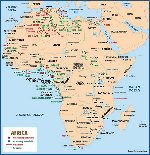Africa: Sudan
August 2000 Vol. 221 No. 8 International Outlook AFRICA Dr. A. F. Alhajji, Contributing Editor Sudan Sudan became an oil exporter in August 199
AFRICADr. A. F. Alhajji, Contributing Editor SudanSudan became an oil exporter in August 1999, when the first 600,000-bbl shipment of oil left Port Bashayir on the Red Sea. Government efforts to improve the economic situation in one of the poorest countries in the world are hindered by civil war, political chaos, economic sanctions and large numbers of refugees from neighboring countries.
By the time the government complied with international demands denouncing terrorism, it was too late. The U.S. imposed another wave of sanctions early this year, extending existing restrictions to include Sudan’s oil sector. Specifically, state-owned Sudpet and the Greater Nile Petroleum Operating Company (which comprises Chinese, Malaysian, Canadian and Sudanese companies) are now restricted. However, Canadian-based Talisman, Sudan’s largest producer, was not affected by the sanctions. Pipeline explosions continued to be the rebels’ favorite method of attacking the government and punishing oil companies that deal with it. Exploration. A new exploration / production sharing agreement was signed between the government and Melut Petroleum Co. It calls for development of the Adar Yel oil fields in the central Sudan Melut basin. The company committed to spending $30 million within three years. The government announced, last May, that it is preparing to offer concessions for the central Blue Nile basin, south of Khartoum. A government survey of the areas indicates that underground geological structures are suitable for oil accumulations. Due to U.S. sanctions, the government expects mostly Asian bidders. Drilling/development. In 1999, there were 47 wells drilled, which is forecast to increase to 60 in 2000. New reports indicate that planing for water injection at Unity field is underway, as well as development of Bamboo and Munga fields. Lundin Oil abandoned its operations in Block 5A last March due to safety and logistical considerations. Lundin plans to resume work in 2001. Last May, after a series of delays, Sudan inaugurated the 50,000-bopd Khartoum refinery. All refinery input is from domestic production. This new addition made Sudan self-sufficient and allowed its first export of refined products in June 2000 (to Turkey). Production. Sudan’s export pipeline, which runs from Heglig and
Unity fields to Port Sudan, went onstream during the summer of 1999. It has a 250,000-bopd capacity that can
be expanded to over 450,000 bopd with additional pump stations. By the end of 1999, the country’s
production was 130,000 bopd and climbing rapidly. This yields an increase of more than 450% since 1998 and a
1999 yearly average of 71,000 bopd. Production is expected to swell to 250,000 bopd by fourth-quarter 2000.
|
- Applying ultra-deep LWD resistivity technology successfully in a SAGD operation (May 2019)
- Adoption of wireless intelligent completions advances (May 2019)
- Majors double down as takeaway crunch eases (April 2019)
- What’s new in well logging and formation evaluation (April 2019)
- Qualification of a 20,000-psi subsea BOP: A collaborative approach (February 2019)
- ConocoPhillips’ Greg Leveille sees rapid trajectory of technical advancement continuing (February 2019)



